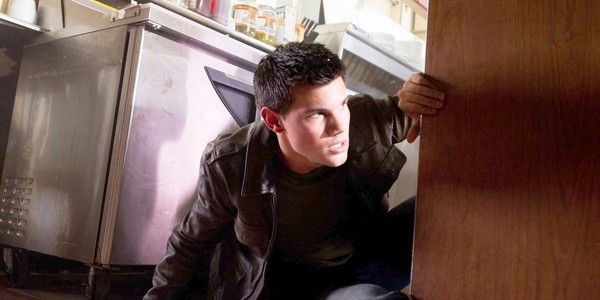Abduction is the first feature film written by Shawn Christensen, the lead singer of indie band Stellastarr*, but there are enough holes in the plot to drive a fleet of SUVs through. The script seems to borrow from a number of superior thrillers, including The Fugitive, Narrow Margin, etc, without really understanding what made them work. And the characters are cliched, and one-dimensional. The dialogue is wooden and inane, and the preview audience howled with laughter at some of the dopey lines (eg: “There’s a bomb in the oven!”)
Lautner plays Nathan Harper, a Pittsburgh teen who finds out some truths about his background. His life is turned upside down after he finds his photograph on a missing persons’ website. But before his “parents” (Maria Bello and Jason Isaacs) get a chance to tell him the truth they are brutally murdered by middle-European gangsters in the employ of the ruthless Kozlow (played by Swedish actor Michael Nyqvist, from the Millennium trilogy). Kozlow wants to force Nathan’s real father, a CIA agent, into the open and retrieve a secret file he has in his possession. Nathan is forced to flee, with his neighbour and love interest Karen (Lily Collins, from Priest, etc) in tow. Nathan has to outwit both the heavily armed gangsters and the CIA, in the form of rogue agent Frank Burton (Alfred Molina), whose loyalties are unclear.
Given the target demographic for this underwhelming popcorn movie the violence has been toned down, which will disappoint the adolescent males who are the main audience for this kind of fare.
The director is John Singleton, who is better known for his intelligent films exploring the problems of contemporary African American youths, like the angry Boyz N The Hood, etc. Singleton has done action before, notably 2 Fast 2 Furious and the remake of Shaft, but here his direction lacks subtlety. Although the film races along at a breakneck pace and there is plenty of action, his direction is uninspired, cluttered and by the numbers. Some of the action sequences are rendered virtually incomprehensible by the kinetic rapid-fire style of editing preferred by today’s directors raised on MTV video clips.
The film boasts a solid cast, all of whom struggle to inject much life or credibility into their one-dimensional characters. Sigourney Weaver in particular struggles with her character, Dr Bennett, Nathan’s sympathetic psychologist who has been treating him for anger management and impulsive behaviour issues. But she knows more about his past than she lets on. And an uncredited Dermott Mulroney contributes a brief appearance towards the end as Nathan’s mysterious biological father.
Lautner proves that he is unable to carry a movie by himself. His performance is fairly wooden, his emotional range limited, and his delivery of dialogue is stilted. However, this will not concern his fans who will lap this up while awaiting the next instalment of the Twilight franchise. Lautner himself must have it written into his contract that he has to appear shirtless at least once in every film, and there are plenty of close-ups of his chiselled features and profile to distract his fans from the more obvious deficiencies of the film.
Collins has a rather bland presence, and there is also a distinct lack of chemistry between her and Lautner.







